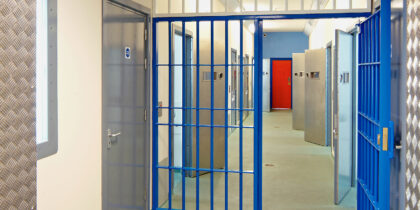 Jessica Stubbs and Dr Graham Durcan
Jessica Stubbs and Dr Graham Durcan
The last two years have seen a marked increase in the number of suicides in English and Welsh prisons, with 89 prisoners taking their own lives in both 2014 and 2015. This was the highest number of suicides since 2007.
In this series of briefings, we have worked with the Howard League for Penal Reform to explore how prisons and healthcare providers can collaborate to prevent suicide in prisons.
Preventing Prison Suicide: Perspectives from the inside focuses on the views and lived experience of those with current or past experience of prison, examining what contributes to vulnerability and risk of suicide.
The report highlights that:
- Staff shortages have increased the risk of suicide
- Relationships between staff and prisoners are key. Prisoners need to feel supported, cared for and able to confide in and trust staff
- Prisoners described a culture where, on the whole, distress was not believed or responded to with compassion
- Change needs to happen across the system to recognize the influence of the prison environment on people’s vulnerability
- Arrival, being released and transferred were all cited as times when prisoners felt most vulnerable
- Staff inexperience and lack of training around mental health were seen as a significant factor in increasing risk. Mental health services in prison were mainly seen by prisoners as providers of medication
- Wellbeing groups, the chaplaincy and imams, peer mentor schemes and listening schemes were helpful
- Prisons should be enabling environments, striving to be a psychologically informed environment with an emphasis on the quality of relationships.
…I was in my 40’s when I first went to prison, I had already had a breakdown, I didn’t know what to expect…I was in a bad way and did consider suicide for the first time ever in my life…I learned to cope, but not everyone does…
You can get very desperate…
I was vulnerable and prison disallowed me from feeling that because I had to put on a façade that I am coping, that I am a tough inmate…
People who do want to take their own life, quite often it happens and no one will know about it… they can’t cry for help because they are not the sort of person who can, or actually, who’s going to listen? It’s all building up and they think, finish it…
The participants of the focus groups also highlighted a number of aspects which could make a difference:
- Staff – more staff, with specialist skills, and better training around mental health awareness
- Meaningful activity – more opportunities to tackle isolation and boredom
- Better support – more signposting at induction; checking-in on the wellbeing of prisoners, especially in the first few weeks; better support for prisoners to transition into society upon leaving prison
- Prison as an Enabling Environment – a whole-system approach which focuses on the quality of relationships and developing a psychologically informed environment.
*Photograph courtesy of Andy Aitchison



